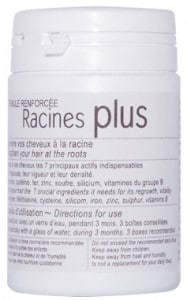AN ESSENTIAL TRIO
These three ingredients are essential, as they form the very raw material of keratin. So it's imperative that you find them in all the alopecia products on offer, whatever the nature of your scalp:
1° Sulphur proteins ⇔ 2° Zinc ⇔ 3° Vitamin B6
1° Sulphur proteins
Keratin is mainly made up of proteins (methionine and cysteine) linked together by sulphur bonds, hence their name sulphur-containing amino acids. Taken in the form of food supplements, these elements can have a triple action:
- They improve the robustness of regrowth and help it to grow,
- They control sebum secretion in cases of hyperseborrhoea (thanks to sulphur),
- They help to eliminate impurities that settle on the roots and prevent them from developing (thanks again to the sulphur).
2° Zinc
- Along with magnesium and copper, it is first and foremost an effective antioxidant for penetrating the micro blood vessels that feed the hair follicle and blocking the path of free radicals, the waste products of cellular life whose devastating action leads to premature ageing of the hair. The 'big' anti-oxidants like vitamins A, C and E cannot get into these tiny vessels.
- It is then essential for the synthesis of keratin proteins by binding their sulphur endings together.
- It is also involved in the synthesis of essential fatty acids, which nourish and prevent the tissues surrounding the hair follicle from drying out.
- It is necessary for the mobilisation of vitamin A, which helps to lubricate the hair, moisturise the scalp and prevent flaking (dandruff).
- In the case of androgenetic alopecia, it helps to inhibit 5-alpha-reductase, the enzyme located in the scalp which causes excess sebum and hair loss.
Caution! Zinc hypervitaminosis can prevent the absorption of copper and cause hair loss through a cascade effect. Zinc contributes to the absorption of iron, which is also very important in the keratin formation process.
3° Vitamin B6
- It is also directly involved in the metabolism of the sulphur proteins in keratin. From methionine, for example, it synthesises cysteine when the latter is not supplied in adequate quantities by food. As vitamin B6 also has another very important function for hair (see next line), it's best to store enough of it so that it can fulfil all its roles.
- It potentiates zinc's inhibitory action on the enzyme (5-alpha-reductase) which causes hair loss and hypersebhoria in case of androgenetic alopecia.
- Anti-stress: it is necessary for the synthesis of taurine (another sulphur amino acid, derived from methionine and cysteine) which calms nervous tension. It also helps to bind magnesium, which is a powerful anti-free radical agent, and contributes to the balance of neurotransmitters by controlling anxiety states. These are important properties when you consider the influence of stress on hair loss.
The following ingredients should not be overlooked either, as they also contribute to the good health of the hair follicle and the number and quantity of new growth. See also our full article on hair vitamins.
OTHER GROUP B VITAMINS
They are the fuel of the hair: they provide the energy production necessary for the renewal of the cells of the hair follicle and the construction of the protein keratin:
- B2 strengthens the protein structure of hair
- B3 vasodilator, increases blood flow to the hair root,
- B5 moisturises and helps hair follicle development,
- B7 cleanses hair roots and dissolves impurities
- B8 stimulates the scalp and is anti-seborrhoeic,
Racines Plus from the Centre Clauderer

At the Centre Clauderer, alongside our topical treatments (Serums 6R and 7R), we offer a course of Racines Plus, a vitamin complex with high doses of vitamins developed by us. Racines Plus regenerates your hair at the root and provides it with the active ingredients essential for regrowth and density: methionine, cysteine, iron, zinc, sulphur, silicon and B-group vitamins.
Ingredients for 2 capsules
Rice protein hydrolysate: 90 mg. Brewer's yeast: 60 mg. Dried pumpkin seed extract: 60 mg. Dried watercress extract: 30 mg. Dried stinging nettle extract: 18 mg. Anticaking agent: silicon dioxide. Anticaking agent: magnesium stearate. Vitamin B3: 16 mg*. Zinc (oxide): 10 mg*. Vitamin B5: 6.0 mg*. Vitamin B6: 1.4 mg*. Vitamin B2: 1.4 mg*. Vitamin B8: 50 µg*. Plant-based envelope: maltodextrin. Lactose-free.
* 100% of RDI (Recommended Daily Intake). Exceeding the percentages recommended by the EU is pointless as our body eliminates the surplus.
EFAs and their antioxidants
EFAs (Essential Fatty Acids)
They nourish the cell membranes and play an active role in the production of new cells and intercellular exchanges in the hair growth zone, which surrounds the hair follicle and root.
A lack of essential fatty acids leads to an overly dry scalp and brittle, thinning hair. This particularly affects some women over the age of 40 and Afro scalps. Unfortunately, EFAs are extremely vulnerable to the action of free radicals and need to be supplemented with vitamin E or vitamin A to prevent them from oxidising and becoming negative for hair growth.
Vitamin E
Vitamin E is a powerful antioxidant. It stimulates oxygenation and blood circulation in the hair follicle, and protects the skin and scalp from drying out by enhancing the action of essential fatty acids.
- With iron: iron is a pro-oxidant, so iron supplements given in cases of iron-deficiency alopecia should always be combined with vitamin E to reduce the risk of oxidation.
- With other antioxidants: far from duplicating each other, the respective actions of the various antioxidants follow a very precise pattern, with each playing its own role. Basically, beta-carotene (pro-vitamin A) protects the interior of fats circulating in the body, while vitamin E protects their envelope, i.e. our cell membranes. Whenever vitamin E encounters a free radical, it interferes and reduces it. But if it is oxidised in its turn, it is out of action unless vitamin C or selenium come to its rescue to regenerate it and enable it to continue its anti-free radical fight.
Beta-carotene, vitamins E and C and selenium all work together. This is why we often recommend anti-oxidant complexes to combat the ageing of the hair's reproductive cells as a whole.
Vitamin A
Vitamin A is a protective agent for the epidermis, exerting a moisturising and anti-infectious action.
- In the case of hypo seborrhoea, it helps to lubricate the hair and prevent the sebaceous glands from drying out and atrophying.
- In the event of scalp irritation, it helps to cleanse the scalp by combating hyperkeratosis (abnormal proliferation of the superficial layers of the skin). This property is confirmed by the medical use of retinoids (chemical molecules of vitamin A) in the treatment of psoriasis. But beware of rebound effects. A chronic excess of vitamin A can lead to the opposite symptoms: dandruff, itching, dryness and hair loss.
Vitamin A exists in two forms:
- Retinol, directly ingested by the body in its active form,
- Beta-carotene, or provitamin A, needs to be synthesised in the intestine before being converted into retinol.
Apart from cases of serious dermatitis, it is advisable to prefer beta-carotene to vitamin A. There are two reasons for this: carotene is completely non-toxic, avoiding the risk of hypervitaminosis, and it has a major antioxidant role (a property that vitamin A does not possess).
MAGNESIUM
- An antioxidant like zinc, it acts as a roadblock to free radicals, extinguishing their fires and preventing them from prematurely destroying the hair's reproductive cells.
- It activates all the B vitamins, the importance of which in cell renewal in the hair follicle has already been mentioned.
- The other reason we often recommend magnesium as part of a hair treatment is its role as a psychological balancer. Since stress is the most common aggravating factor in alopecia of hormonal origin, we recommend taking magnesium to control nervous tension and its impact on hair loss.
Magnesium needs a fixative and can be administered with vitamin B6.
VITAMIN D
It occupies a special place in the world of vitamins. Today, a number of discoveries are revolutionising our knowledge of its properties, including its effect on hair.

